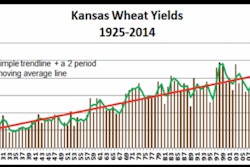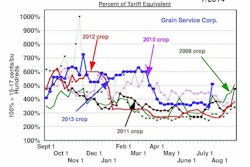
The beautiful thing about learning is that no one can take it away from you.” - B.B. King, American musician.
继续教育,它是重要的是什么?
Continuing education is generally thought of as post-degree education which occurs after high school or college. It can take many different forms. From the standpoint of your grain and feed business it can include any or all of the following: 1.) Workshops or other types of training — be they internal or external; or 2.) Degree-seeking programs. The focus of this column is to discuss the potential value of continuing education for you and for your employees.
A recent study conducted by Spherion Atlantic Enterprises, a staffing and employment services company, found that 61% of respondents who received training or mentoring said they were more likely to remain with their current employer for the next five years or more! For your company, such a benefit can help you to attract and retain great employees.
There is no doubt that education pays dividends. In a recentThe New York Timesarticle, columnist Anna Bernasek posits that “much of what a nation wants from its schools has nothing to do with money. Consider the social and cultural benefits, for instance: making friends, learning social rules and norms and understanding civic roles.” But, she goes on to argue that “some of the most sought-after benefits from education are economic. Specialized knowledge and technical skills, for example, lead to higher incomes, greater productivity and generation of valuable ideas.” These are the returns that we want in a business sense.
In the same article, Bernasek cites two Harvard economists, Lawrence F. Katz and Claudia Goldin, who studied the effect of increases in educational attainment in the United States labor force from 1915 to 1999. They estimated that those gains directly resulted in at least 23% of the overall growth in productivity, or around 10% of growth in gross domestic product. As economists, we would like to be able to cite a study which indicates for every $x invested in education, we receive $x in return. However, no quick and easy number exists — due to the fact that education provides both an individual benefit (for the person being educated) and societal benefits (for everyone — also known as an “externality,” in this case a positive externality). The question then becomes who should do the investing — the individual, his or her employer, or society? Our answer would be that it can be combinations of all three.
A possible company benefit
Paying for continuing education or providing internal training allows your employees to feel satisfied in both their professional and personal lives. And, like any benefits program, education benefits require both foresight and planning on your part. From a management standpoint, this investment will generally pay off — in better trained, more productive and more highly motivated employees. In addition, as more and more millennials (defined as a person reaching young adulthood around the year 2000) are hired, numerous human resource experts and consultants are indicating that this group of folks likes training and education opportunities. In fact, while millennials are more likely to have advanced degrees, many have less formal training in both “hard skills” and “soft skills,” and these are the areas you can assist them with by training and education.
External education
Tuition reimbursement is the most common form of educational benefit. As manager for your grain and feed business, you will need to determine what type of classes will you cover? External choices (internal choices are covered below) will include: 1.) Vocational or Technical: education or training that focuses on a specific skill or trait. An example might be learning how to weld.2.) Professional: professional studies tend to focus on a group or set of skills, and are more broadly focused. An example might be a Bachelor of Science in a field such as Animal Science to prepare a person to be a livestock nutritionist or a Master of Business Administration (M.B.A.).
Most employers require that classes be directly related to their employee’s current job or career path. This makes sense, due to the joint nature of education described above. You desire the benefit from the investment in your employee’s education, but they benefit as well, as education adds to their human capital value (marketability).
Specifics are important
As you give some thought to the type of educational benefit you will provide, consideration will need to be given to a number of variables: 1.) Will you reimburse tuition only, or will you also cover books? 2.) Will you cover all the costs, or will you put a cap on reimbursements? 3.) Does reimbursement depend on your employee’s performance in the class? (In other words, will you require the employee to achieve a certain grade in the course?) 4.) Are all employees eligible for the benefit, or just full-time employees? 5.) Will you require that your employees provide some justification for the courses or degrees they want to pursue, and will they be required to report back in some way on what they have learned (presentation to you, or perhaps a seminar to other employees)?
Additionally, there are other ways your business can support employee’s efforts to improve their expertise and value to your company — beyond just paying for tuition. Such ways include allowing time off for classes or allowing the employee time during the workday to work on assignments.
Internal education
We have touched on this topic a bit in previous columns, but internal education can be a great motivator and team builder. The challenge becomes picking topics and presenters that provide value. In the feed and grain industry, you can move from the general to the specific. All employees can benefit from general sessions such as: customer service, telephone professionalism, safety, time management, supervising others and communication strategies. While we do not endorse products or services in this column, we did find an employee training site, which combines lessons and short videoson numerous topics of general use —https://www.bizlibrary.com/. They offer a free trial, followed by fee for services if you like what you find.
Another, often overlooked method of training is to ask and empower some of your key people to put together classes. This approach does several things. It allows your key employee to share their expertise and enthusiasm; it also positions him/her as an expert, and the rest of your employees gain from the knowledge they receive.
More precise training tends to be targeted to specific employees: animal health and nutrition training for feed salespeople; marketing seminars for your grain merchandising staff; and grain quality and handling workshops for your elevator staff. Many times your suppliers can provide this sort of training — perhaps accompanied by a meal.
Continuing education for you as a manager
我们列出了一些想法和c的好处ontinuing education for your employees above. Do the same apply to you as an owner/manager? Most certainly! The trick becomes finding the time to fit it in. However, the same benefits apply to you as to your employees — training and education gives you new capabilities, new skills and perhaps most importantly new ideas that will likely boost your enthusiasm and motivation.
Ideas for this education include all of the possibilities discussed previously, but perhaps with more focus on higher-level opportunities such as an executive M.B.A. Two programs which come to our minds (again, with the caveat mentioned above that we do not endorse what they are offering) are offered by Purdue and Kansas State University (see:http://www.agecon.purdue.edu/agribusinessandhttp://www.mab.ksu. edu). Both programs offer significant distance components, combined with short periods of on-campus education and collaboration.
Looking specifically at the areas which might benefit you most as a manager — two particular areas come to mind: business strategy and human resource management. These are both areas which can have significant impact on the success of your business, and are ones which can benefit from augmenting your skill set. A short-term program worth looking at is the Human Resources Studies Certificate offered by Cornell University’s School of Industrial and Labor Relations —http://www.ilr.cornell. edu/hcd). Their program covers HR law, effective interviewing and performance management and appraisal and other key personnel management topics. For business strategy, Harvard is a name that often rises to the top. Harvard’s Division of Continuing Education offers a number of two-day professional development programs across a number of topics including strategy: Fundamentals of Strategy, Design Thinking Workshop and Strategic Management of Growth Companies. Seehttp://www.dce. harvard.edu/professional/programs.
Training, education — it is all good!
Increased enthusiasm, increased productivity and improved creativity are some of the positive outcomes for investing in training and education for you and your employees. You need to determine what best fits your feed and grain business, but online learning has made some of these choices easier, more efficient and cost-effective.
In addition, for you as manager further education can also be valuable. New insights, broader perspective and exposure to different strategies and analytics can be great additions to your skill set and improve your firm’s profitability. Former President John F. Kennedy once said, “Our progress as a nation can be no swifter than our progress in education.” We believe the same is true for progress in your business success!






















